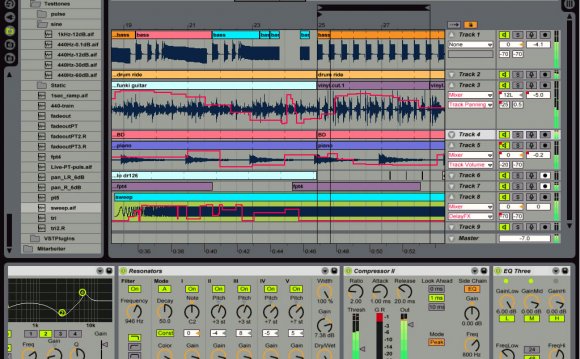
During the last ten years, GarageBand has transformed into the Starbucks of digital recording studios: consumer-friendly, worldwide, omnipresent. Pre-programmed into every Apple product, anyone with an iPhone, iPad, or Mac can open this system and record one thing amazing (or, maybe more likely, something totally embarrassing). Along with Apple offering almost 300 million products in the last year alone, it is no wonder that GarageBand features engendered compliments because of its egalitarian simplicity in addition to some ire because of its creative limits.
While GarageBand results have directly blended into the noise palette of perhaps the top music—the beat for Rihanna's "Umbrella", for example, was created utilizing among the program's loops—it's played a higher role by compressing the area between an expensive studio and a Do-it-yourself singer's bed room, between professionalism and amateurism. For many artists, the standard pc software acts as their first home tracking device, digital effects pedal, rehearse space, and, quite often, their particular very first bandmate.
Take Claire Boucher, aka Grimes, who invested years tooling around with GarageBand in Montreal's underground scene while seeking the woman vocals as a musician and producer. Those experiments in the course of time resulted in the 27-year-old's breakthrough record, Visions, which was taped completely on electronic sound workstation, or DAW. Ultimately, though, she noticed the program's limitations cannot keep up with her appetite for digital complexity. "it surely can not do just about anything, " Boucher as soon as informed Clash magazine. "there is not a lot of material in GarageBand that is great." Boucher features since graduated to heightened DAWs like Ableton Live.
For other individuals, like fantasy pop singer/songwriter Dee Dee of Dum Dum women, GarageBand is all about as far as they would always explore the electronic world. "we open programs like Ableton and sort of stare mouth agape within display screen, " says Dee Dee, whom began the woman fuzzed-out girl team project inside her l . a . room utilizing GarageBand but still transforms into the system while demoing her ideas. And files by ideal Coast and Vivian Girls, Dum Dum Girls' first record, i'll be, aided determine indie's lo-fi sound inside late-2000s; Dee Dee produced that album's backbeat by manipulating Apple drum loops to simulate an effect like Phil Spector's Wall of Sound, really using digital computer software to provide modern music a vintage feel—a method might earn some analog purists' minds spin.
Though DDG albums are augmented by professional producers and engineers, the process of changing Dee Dee's GarageBand demos into studio tracks is not about washing away the digital impact. "It is basically the anchor of her work, so we simply enhance plenty of exactly what she does in GarageBand, " says longtime DDG producer and 75-year-old industry lifer Richard Gottehrer, whoever 50-year career includes co-writing Brill Building pop music hits and manning the panels for Blondie's first two records. Gottehrer's open-minded method reveals that the acceptance of GarageBand as a legitimate music-making tool isn't solely according to one's age or experience.
The idea of utilizing GarageBand along with more conventional studio techniques is seconded by producer Ariel Rechtshaid, 36, who's got collaborated using what he calls "GarageBand-ed out" performers like Blood Orange's Dev Hynes and Haim, as well as well-versed musicians including Madonna additionally the Killers' Brandon Flowers. While using Haim a few years ago, Rechtshaid found among the trio's GarageBand demos, casually dubbed "My Song 5", which included a horn native to the application. That staggering baritone wobble—which "seems like a bass as it had been set two octaves down accidentally, " relating to Rechtshaid—eventually became more distinctive sonic earmark off Haim's wildly popular debut record, Days have left. "GarageBand made anybody who buys an Apple computer system a producer, " gushes Rechtshaid.









